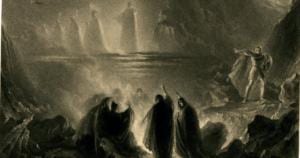The Witch or the Wise Woman
 Beware witchy witches and fight demons, but if you meet Hermione at Hogwarts, make friends quickly and listen to what she says. Do not, ever, attempt to force the powers of the cosmos to tell you what a man should not know, but wherever you can find insight from Homer to Husserl take the wisdom.
Beware witchy witches and fight demons, but if you meet Hermione at Hogwarts, make friends quickly and listen to what she says. Do not, ever, attempt to force the powers of the cosmos to tell you what a man should not know, but wherever you can find insight from Homer to Husserl take the wisdom.
Wisdom is always of God: trying to manipulate God with tricks is not. Some witches are witchy, horrific, and some are the wise woman Diotima helping Socrates find the good, true and beautiful. A problem is that English gives us one word for both: the wise woman with lore (God bless her!) and the demon powered.
A trouble of reading a book written in one language in another culture is not just knowing the other cultural context and the advantages and limitations of the vocabulary of the other language, but knowing the nuances and multiple meanings of our own language! With witchy witches a Christian can have no commerce, because we must not use the spiritual with our own personal peace, affluence, or “knowledge” as the primary goal.
How can one tell the difference?
Shakespeare has a suggestion.
Macbeth is a Useful Idiot for Evil: Sometimes if they mean to seem evil, they are evil.
If your personal consultant says when meeting with her friends:
Fair is foul, and foul is fair, Hover through the fog and filthy air.*
this is a bad sign of witchy witches and not of wise women. If people love evil or call evil good, those people will do what should not be done to gain power, pleasure, or demonic power. Macbeth does not hear this set of lines, so why blame him?
If you are taking life altering advice from a powerful person, take the time to find out his or her worldview. Then again, the weird sisters were not hiding their wickedness. When Macbeth meets them, they are disturbing, but give him good news. Let’s pause: oddness is not enough to dismiss the weird sisters. If that were true, every holy fool in history would be ignored, every eccentric with a genius idea, and more than a few wise women with powerful ideas.
When we do not like the message, it is too easy to cry “Jezebel” when we have actually met the godly and wise Hulda. Still, trying to seem evil is a warning: evil might come as an angel of light at times, but goodness rarely means to look evil. Especially when we like a message from the beyond, we should be cautious of the source. Macbeth learns he will be promoted and some day be king and he very much wishes this to be true.
Now is the time for Macbeth to use caution: what looks evil is speaking his desire and the fruit is immediate gratification. That should be the fatal tip off and I should learn from this. O my Soul: Beware, whether she is fair or foul, one who speaks fair and makes me foul.
There are false fundamentalists who will not read Harry Potter, but will hear a so-called “man of God” who attacks those they despise (sometimes even themselves) and uses psychological tricks, and false powers to encourage people to do what they already wish to do.
Such but for the grace of God go all of us.
Like Macbeth, we would listen even to weird sisters if they tickle our ears with pleasant prophecy. Macbeth, like Saul with the witchy witch of Endor, cuts himself off from wise women and men. He and his wife commit murder and plunge deep into madness.
Why?
Witchcraft, of the sort Macbeth finds, uses even the truth to warp our minds and snuff out the light in our hearts.
This is not the magic of Narnia or the wizardry of wise Gandalf. English has too few words for the sages, those who know nature and the Platonic forms. If they know God, these sages, know the boundaries set by God. They ask for the prayers of the righteous dead, but they know that demanding the dead speak breaks the laws of God. How? The witchy witch or warlock importunes or attempts by spell or portion to force the dead to do what they would not do.
The unrighteous might long to speak to us, but nobody but a fool wishes to know what they have to say. Macbeth does and that is the start of his doom. He had Sacred Scripture, the mysteries of the sacraments, centuries of wisdom in God-breathed books by wise women and men. There were spiritual mothers and fathers with gifts from God.
What Macbeth will not find from the Divine is encouragement to do evil or to use people as a means to his own advancement. The demons will deceive and we end up fighting with God and His holy angels.
May I learn from Macbeth’s fall and pray this All Hallows’ :
St. Michael the Archangel, defend us in battle, be our protection against the wickedness and snares of the devil. May God rebuke him we humbly pray; and do thou, O Prince of the Heavenly host, by the power of God, cast into hell Satan and all the evil spirits who prowl about the world seeking the ruin of souls.
Amen.
—————————————
*Shakespeare, Macbeth. 1.1
















